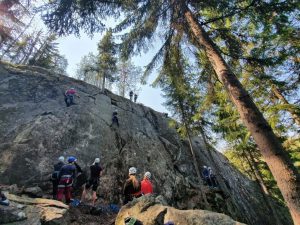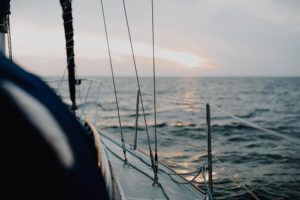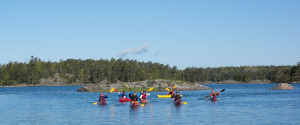Turning Practical Learning Into Adacemic Work – Adventure Educational Theses Respond to Societal Needs

The degree program in Adventure and Outdoor Education provides students with a unique and wide range of skills for employment as a professional in the diverse area of adventure and outdoor education. Even though the studies emphasize practical learning, much like anyone pursuing a higher education degree, adventure education students must produce an academic thesis in order to graduate. How can such activity-based learning be turned into academic work that serves a purpose?
Since launching in 2018, Humak’s Community Educator Bachelor’s Degree Program focused on Adventure and Outdoor Education has attracted an increasing number of applicants both internationally and in Finland. The degree program has gathered positive feedback from students and piqued the interests of many. We are seeing more and more students graduating from the program with theses that address significant societal issues.
Adventure education is based on an experiential learning model which supports the student through activity-based learning. A substantial part of the studies consists of practical learning by doing in authentic real-life environments. So how is the academic side of adventure education? What kind of topics were tackled by recent graduates in this spring’s thesis seminar?
After graduation, students have multiple employment opportunities within the different sectors of national and international working environments. Read more about the career paths of adventure educators now and in the future here.

What Is an Adventure Educational Thesis?
The last push for many students trying to acquire a higher education degree is writing a thesis. In universities of applied sciences, theses usually are commissioned and centered around a real life need arising from their fields of expertise.
Since adventure education is so activity-based, their thesis process is especially interesting. How do you use a skillset such as first aid, hiking, trekking, and climbing to produce academic work that serves a purpose?
The following two theses were showcased in the Adventure and Outdoor Education Thesis Seminar this spring semester. They are excellent examples of showing adventure educational competencies and grasping the idea of adventure education responding to societal needs.

How Do Long-Term Expeditions Affect Young People’s Personal Development?
How can we make long-term expeditions as rewarding as possible for young people? That is at the heart of Alisa Denisov’s thesis “The Effects of Long-Term Sail Training Trips as Part of Alternative Education on Young People’s Personal Development. Case Study: Ocean College.”
Since activity-based trips are a huge part of adventure education, it is important to ensure that they offer students meaningful learning experiences in terms of social skills, practical skills and reflection. Long-term expeditions are excellent opportunities to improve one’s personal development skills.
In order to make such trips as rewarding as possible for students, it is important to figure out what can be improved in the organization process. Denisov collected feedback from students who had completed long-term sail training trips through Ocean College. Based on that, Denisov came up with development advice for future organizers of expeditions. These included possibilities for self-organized travel, sustainability in food, co-decision in rules, more responsibility in ship handling, etc.
The participants reported predominantly beneficial experiences, however. In terms of personal development, it was very common among students to have gained a lot of self-confidence. They also reported a better understanding of their personal strengths and weaknesses. Therefore, it was easier for students to overcome their fears and limitations. Additionally, the trips offered a new perspective for many and a newfound appreciation for “trivial” things.
One of the most inspiring aspects regarding Denisov’s thesis is the fact that the findings are applicable to all long-term expeditions. In other words, organizers of such expeditions could use the findings of the study as guidelines in developing their operations.
“This is of the best bachelor’s theses ever,” said Team Leader Tero Lämsä during the seminar. Lecturer Kai Lehtonen also agreed, stating that “involving the students in decision-making is important and would make the experience better.”

Prioritizing Professionalism and Safety in Outdoor Activities
Emma Lehto’s thesis “Safe Adventure Programming for Outdoor Associations: Paddling in Suomen Latu ry” focuses on making a development plan for paddling in Suomen Latu. As recreational paddling has become such a popular activity during the past years, it is necessary to ensure that relevant service providers know exactly what factors to consider especially in terms of safety, which should always be a priority.
The results revealed a lack of skilled instructors, which held back the growth of paddling. Some of the main challenges also included aging, lowered motivation and difficulty to certify paddling competency – and, of course, safety issues.
“There was also a widespread misconception that paddling somehow becomes a serious business if rules are applied,” said Lehto during the seminar.
Lehto agrees that good paddling activities are firstly fun and recreational. However, Suomen Latu could make the impact deeper by offering also educational and developmental approaches to their processes.
“Everyone’s skills are adequate for a slow paddling on a calm summer evening,” said one of the respondents to Lehto’s questionnaire. “Technical knowhow and rescue skills are the ones that need attention.”
Lehto applied a three-level adventure programming principle to form the development plan. The individual level certified paddling competency, the associational level concentrated on safe and meaningful programs and activities, and the leadership level focused on defining the safety and competency requirements for paddling.
“Currently there is more need for paddling services than there are competent instructors,” said Lehto.
Hopefully her development plan helps to change that. It was offered to Suomen Latu as well as followed by an adventure programming chart to help any association or club to develop their activities and to set achievable goals.

Interested in Other Adventure Educational Theses?
Do check out these theses from recent graduates:
Lindström, Milla (2022), “Pedagogical Goals Presented in Program Cards: Youth Centre Marttinen”.
Rönkkö, Aatu (2022), “Listening to Children’s Voice: Developing a Questionnaire to Gather Information About Hobbies and Leisure Time Activities”.
The next application period for Bachelor of Humanities, Adventure and Outdoor Education, is in January 2023. You can find more information about the degree program on Humak’s website.
Text: Mari Ervasti, Petra Karjalainen
2022-07-05 11:00:11